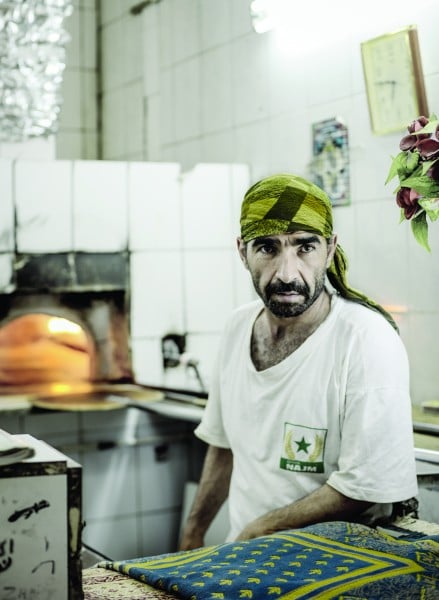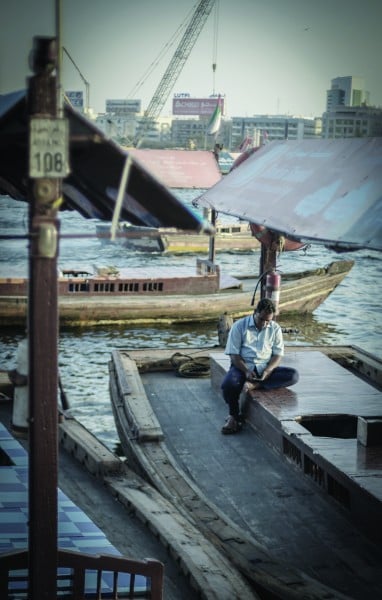
Ekta Saran abandoned agency life to roam the streets of Bur Dubai armed only with her camera. She tells Eleanor Dickinson why
The filmmaker Ekta Saran is sipping ginger tea and reminiscing about a time when the World Trade Centre was the tallest city in Dubai. “My father used to say to me as we drove past it, ‘Ok now you have to count all the floors before we pass by’ and I could only ever get to 23 or 24.” She smiles as she looks
at our surroundings: “Now there are tall, tall buildings everywhere.”
Nearly two decades later, we are sat in Café M engulfed by the neck-aching heights of Dubai Marina’s skyscraper skyline. As a former copywriter for Lowe, Saran is in familiar territory. But it is
the old city – the crowded, sandstone streets beyond
the World Trade Centre – where Saran, a global citizen who has lived in three different countries, really feels
at home.
“My parents are from India and I was born in Abu Dhabi, lived in Sharjah, then in a couple of places in India and Vancouver, but I lived in Karama for years and years,” she explains. “So I knew the old Dubai that I grew up in. There’s something that really draws me there; I’d go for walks along the Creek or take the dhow ride over, walk along Karama – I’ve always done that.”
Having quit agency life two years ago, Saran began freelancing as a photographer and filmmaker. However, it was during the intense heat of summer last year that she decided to embark on her own personal project. “After being in the film and photography world for a while you get into a certain routine of deadlines,” she says. “And as much as I love what I do, at the end of the day it’s commercial work and you get stuck in a rut of deadlines and you have to comply to what the client has to say and
so on. And I think I really missed my early life of the freedom of just being on the street and photographing and nobody is really expecting anything from me. And the summer can get really dreary and dead here so I was getting a bit restless and I needed to do something.”
It was while wandering her haunts in Bur Dubai that Saran began photographing and then making short videos of some of the community’s long-established residents. And so began ‘Chasing Bur Dubai’, a short film series documenting stories of people who have spent their lives on the periphery of the Burj Khalifa glamour, but yet played a key role in the Dubai story. So far the series has visited a barbershop that opened 25 years ago and Meher Recording, the oldest music shop in Bur Dubai.

After our meeting, Saran is going to meet a street cobbler of 25 years, whose father worked as a cobbler 20 years before him – another sign that “there’s more to Dubai than the Burj Khalifa and Sheikh Zayed Road”.
Yet while hoping to show the world these hidden undercurrents around the Creek, Saran’s project also became something of an attempt to come to terms with her own identity. “I’m an expat kid,” she says. “I don’t really have a home and this is the closest I can claim to as having something of a home. It became almost like a personal diary, but I thought if someone wants to see it then that’s great because it’s almost for my own record. But there was a part of me that said if no one documents this then it’s going to go one day. And I’m really fearful of that because generally in life as we evolve as human beings there are so many little things that are dying and we will never know or hear about.
“I always wondered as well about Dubai as a place where everyone is from everywhere else. People like those in Bur Dubai who have built their entire lives there and have been there 25 plus years. They built homes for their families back home but they live here. There must be a certain sense of identity crisis that I’ve always felt and I’ve always wanted to ask the question: ‘where do you belong?’
“And I think a part of my work in Bur Dubai was to answer that question for myself by asking someone else. And in the process of trying to answer that I found people very similar to me who don’t feel like they are at home here or they don’t feel at home back in India. But because they’ve been here so long, they don’t really fit in where they used to be, but they can never fully be part of here, so where do you belong? Yet what I found is you try and fit yourself to your surroundings and that’s Ok. I think that was my learning; there are people there who don’t really belong, but it’s Ok.”










